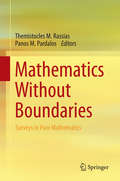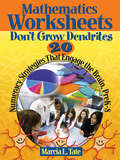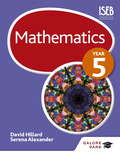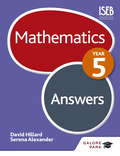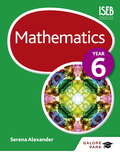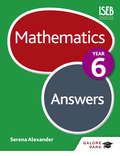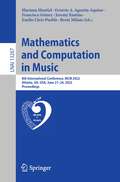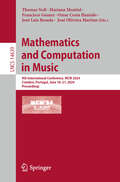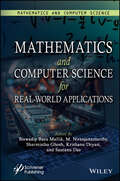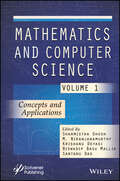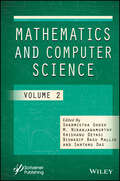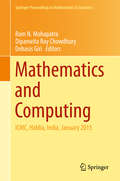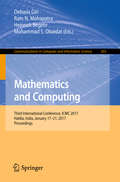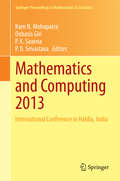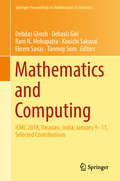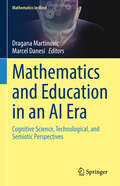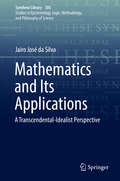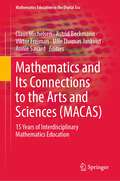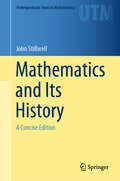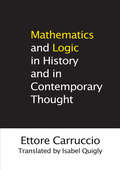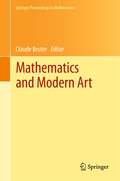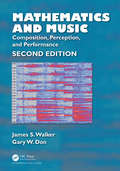- Table View
- List View
Mathematics Term-3 class 7 - Tamil Nadu Board: கணக்கு ஏழாம் வகுப்பு பருவம் 3
by State Council of Educational Research and Training Tamil Naduஏழாம் வகுப்பு கணிதம் மூன்றாம் பருவம் தமிழ்நாடு பாடத்திட்டம் 2023 புத்தகத்தில் கன அளவு மற்றும் பரப்பளவு, மெய் எண்கள், இயற்கணிதம், வடிவியல் மற்றும் தரவு கையாளுதல் ஆகிய முக்கியமான கணிதக் கருத்துக்கள் இடம்பெற்றுள்ளன. இந்த பாடத்திட்டம் மாணவர்களின் கணித அறிவை விரிவுபடுத்தி, சிக்கல் தீர்க்கும் திறனை மேம்படுத்த வடிவமைக்கப்பட்டுள்ளது. மாணவர்கள் கன அளவு மற்றும் பரப்பளவைக் கணக்கிடுவது, மெய் எண்களைப் புரிந்துகொள்வது, இயற்கணிதச் செயல்பாடுகளைச் செய்வது, வடிவங்களை அடையாளம் காணுதல் மற்றும் தரவுகளை பகுப்பாய்வு செய்வது போன்ற கணிதக் கருத்துக்களை கற்றுக்கொள்வார்கள்.
Mathematics Without Boundaries
by Panos M. Pardalos Themistocles M. RassiasThis volume consists of chapters written by eminent scientists and engineers from the international community and present significant advances in several theories, methods and applications of an interdisciplinary research. These contributions focus on both old and recent developments of Global Optimization Theory, Convex Analysis, Calculus of Variations, Discrete Mathematics and Geometry, as well as several applications to a large variety of concrete problems, including applications of computers to the study of smoothness and analyticity of functions, applications to epidemiological diffusion, networks, mathematical models of elastic and piezoelectric fields, optimal algorithms, stability of neutral type vector functional differential equations, sampling and rational interpolation for non-band-limited signals, recurrent neural network for convex optimization problems and experimental design. The book also contains some review works, which could prove particularly useful for a broader audience of readers in Mathematical and Engineering subjects and especially to graduate students who search for the latest information.
Mathematics Worksheets Don't Grow Dendrites: 20 Numeracy Strategies That Engage the Brain, PreK-8
by Marcia L. TateEngage students in effective, meaningful experiences in mathematics! Following the format of Marcia L. Tate’s previous bestsellers, this user-friendly guide offers math teachers 20 powerful, brain-based teaching strategies that incorporate visual, auditory, kinesthetic, and tactile modalities to promote student engagement and achievement. The book focuses on the NCTM focal points and includes a bibliography of math and literature resources and a lesson planning guide. The chapters offer: A what, why, and how for each strategy Specific brain-compatible mathematics activities and lessons from real teachers across the country Space for teachers to reflect on and apply individual strategies in their lessons
Mathematics Year 5
by Serena Alexander David HillardA stimulating and rigorous approach to Mathematics that goes beyond the requirements of the National Curriculum for Year 5 pupils (aged 9 and above) and lays the foundation for success at Common Entrance and other independent entrance exams at 11+. - Plenty of worked examples to demonstrate method- Develops key skills with clear explanations and diagrams- Challenges pupils with exercises at various levels- Tests understanding with end-of-chapter activities Galore Park Mathematics Year 5 Answers is available to purchase, which includes photocopiable worksheets for selected exercises and activities.Also available from Galore Park www.galorepark.co.uk:- Mathematics Year 6- 11+ Maths Practice Exercises- 11+ Maths Revision Guide- 10-Minute Maths Tests Workbook Age 8-10- 10-Minute Maths Tests Workbook Age 9-11- Mental Arithmetic Workbook Age 8-10- Mental Arithmetic Workbook Age 9-11
Mathematics Year 5
by Serena Alexander David HillardA stimulating and rigorous approach to Mathematics that goes beyond the requirements of the National Curriculum for Year 5 pupils (aged 9 and above) and lays the foundation for success at Common Entrance and other independent entrance exams at 11+. - Plenty of worked examples to demonstrate method- Develops key skills with clear explanations and diagrams- Challenges pupils with exercises at various levels- Tests understanding with end-of-chapter activities Galore Park Mathematics Year 5 Answers is available to purchase, which includes photocopiable worksheets for selected exercises and activities.Also available from Galore Park www.galorepark.co.uk:- Mathematics Year 6- 11+ Maths Practice Exercises- 11+ Maths Revision Guide- 10-Minute Maths Tests Workbook Age 8-10- 10-Minute Maths Tests Workbook Age 9-11- Mental Arithmetic Workbook Age 8-10- Mental Arithmetic Workbook Age 9-11
Mathematics Year 5 Answers
by Serena Alexander David HillardFeatures the complete set of answers to the exercises in Mathematics Year 5, as well as a selection of photocopiable worksheets to save you time and enable you to identify areas requiring further attention.The book includes diagrams and workings where necessary, to ensure pupils understand how to present their answers, as well as photocopiable worksheets at the back of the book.Also available from Galore Park www.galorepark.co.uk:- Mathematics Year 5- Mathematics Year 6- Mathematics Year 6 Answers- 11+ Maths Practice Exercises- 11+ Maths Revision Guide- 10-Minute Maths Tests Workbook Age 8-10- 10-Minute Maths Tests Workbook Age 9-11- Mental Arithmetic Workbook Age 8-10- Mental Arithmetic Workbook Age 9-11
Mathematics Year 6
by Serena AlexanderA stimulating and rigorous approach to Mathematics that goes beyond the requirements of the National Curriculum for Year 6 pupils (aged 10 and above) and lays the foundation for success at Common Entrance and other independent entrance exams at 11+.- Plenty of worked examples to demonstrate method- Develops key skills with clear explanations and diagrams- Challenges pupils with exercises at various levels- Tests understanding with end-of-chapter activities Galore Park Mathematics Year 6 Answers is available to purchase, which includes photocopiable worksheets for selected exercises and activities.Also available from Galore Park www.galorepark.co.uk:- Mathematics Year 5- 11+ Maths Practice Exercises- 11+ Maths Revision Guide- 10-Minute Maths Tests Workbook Age 8-10- 10-Minute Maths Tests Workbook Age 9-11- Mental Arithmetic Workbook Age 8-10- Mental Arithmetic Workbook Age 9-11
Mathematics Year 6
by Serena AlexanderA stimulating and rigorous approach to Mathematics that goes beyond the requirements of the National Curriculum for Year 6 pupils (aged 10 and above) and lays the foundation for success at Common Entrance and other independent entrance exams at 11+.- Plenty of worked examples to demonstrate method- Develops key skills with clear explanations and diagrams- Challenges pupils with exercises at various levels- Tests understanding with end-of-chapter activities Galore Park Mathematics Year 6 Answers is available to purchase, which includes photocopiable worksheets for selected exercises and activities.Also available from Galore Park www.galorepark.co.uk:- Mathematics Year 5- 11+ Maths Practice Exercises- 11+ Maths Revision Guide- 10-Minute Maths Tests Workbook Age 8-10- 10-Minute Maths Tests Workbook Age 9-11- Mental Arithmetic Workbook Age 8-10- Mental Arithmetic Workbook Age 9-11
Mathematics Year 6 Answers
by Serena AlexanderFeatures the complete set of answers to the exercises in Mathematics Year 6, as well as a selection of photocopiable worksheets to save you time and enable you to identify areas requiring further attention.The book includes diagrams and workings where necessary, to ensure pupils understand how to present their answers, as well as photocopiable worksheets at the back of the book.Also available from Galore Park www.galorepark.co.uk:- Mathematics Year 6- Mathematics Year 5- Mathematics Year 5 Answers- 11+ Maths Practice Exercises- 11+ Maths Revision Guide- 10-Minute Maths Tests Workbook Age 8-10- 10-Minute Maths Tests Workbook Age 9-11- Mental Arithmetic Workbook Age 8-10- Mental Arithmetic Workbook Age 9-11
Mathematics and Computation in Music: 8th International Conference, MCM 2022, Atlanta, GA, USA, June 21–24, 2022, Proceedings (Lecture Notes in Computer Science #13267)
by Octavio A. Agustín-Aquino Emilio Lluis-Puebla Mariana Montiel Francisco Gómez Jeremy Kastine Brent MilamThis book constitutes the thoroughly refereed proceedings of the 8th International Conference on Mathematics and Computation in Music, MCM 2022, held in Atlanta, GA, USA, in June 2022. The 29 full papers and 8 short papers presented were carefully reviewed and selected from 45 submissions. The papers feature research that combines mathematics or computation with music theory, music analysis, composition, and performance. They are organized in Mathematical Scale and Rhythm Theory: Combinatorial, Graph Theoretic, Group Theoretic and Transformational Approaches; Categorical and Algebraic Approaches to Music; Algorithms and Modeling for Music and Music-Related Phenomena; Applications of Mathematics to Musical Analysis; Mathematical Techniques and Microtonality
Mathematics and Computation in Music: 9th International Conference, MCM 2024, Coimbra, Portugal, June 18–21, 2024, Proceedings (Lecture Notes in Computer Science #14639)
by Thomas Noll Mariana Montiel Francisco Gómez Omar Costa Hamido José Luis Besada José Oliveira MartinsThis book constitutes the refereed proceedings of the 9th International Conference on Mathematics and Computation in Music, MCM 2024, held in Coimbra, Portugal, during June 18–21, 2024. The 30 full papers and 9 short papers included in this book were carefully reviewed and selected from 45 submissions. They were organized in topical sections as follows: mathematical scale theory and tuning; rhythm analysis and rhythm generation; categorical and algebraic approaches to music; quantum music; theory and algorithms for melodic- harmonic analysis and generation; geometric approaches to musical algorithms and microtonality; fourier analysis for music; similarity and distance measures for music; short papers; communication-performances; and tribute to Yves Hellegouarch.
Mathematics and Computer Science for Real-World Applications, Volume 4
by Santanu Das M. Niranjanamurthy Sharmistha Ghosh Krishanu Deyasi Biswadip Basu MallikMathematics and Computer Science for Real-World Applications gives invaluable insights into how mathematical and computer sciences drive essential modern innovations that enhance everyday life, making it a must-read for anyone interested in the intersection of mathematics and technology and their real-world applications. Mathematical sciences are part of nearly all aspects of everyday life. The discipline has underpinned beneficial modern capabilities, including internet searches, medical imaging, computer animation, numerical weather predictions, and digital communication. Mathematics and computer science are constantly evolving and contributing to most areas of science and engineering, therefore, future generations of mathematical scientists should reassess the increasingly cross-disciplinary nature of the mathematical sciences. Mathematics and Computer Science for Real-World Applications presents current scientific and technological innovations from leading academics, researchers, and experts across the globe in mathematical sciences and computing. The volume will discuss new technical ideas and features that can be incorporated into day-to-day life for the benefit of society. A diversified spectrum of scientific advancements is discussed, including applications of differential and integral equations, computational fluid dynamics, nanofluids, network theory and optimization, control theory, machine learning, and artificial intelligence. Readers will explore diverse ideas and innovations in the field of computing and its growing connections to various fields of mathematics.
Mathematics and Computer Science, Volume 1
by M. Niranjanamurthy Sharmistha GhoshMATHEMATICS AND COMPUTER SCIENCE This first volume in a new multi-volume set gives readers the basic concepts and applications for diverse ideas and innovations in the field of computing together with its growing interactions with mathematics. This new edited volume from Wiley-Scrivener is the first of its kind to present scientific and technological innovations by leading academicians, eminent researchers, and experts around the world in the areas of mathematical sciences and computing. The chapters focus on recent advances in computer science, and mathematics, and where the two intersect to create value for end users through practical applications of the theory. The chapters herein cover scientific advancements across a diversified spectrum that includes differential as well as integral equations with applications, computational fluid dynamics, nanofluids, network theory and optimization, control theory, machine learning and artificial intelligence, big data analytics, Internet of Things, cryptography, fuzzy automata, statistics, and many more. Readers of this book will get access to diverse ideas and innovations in the field of computing together with its growing interactions in various fields of mathematics. Whether for the engineer, scientist, student, academic, or other industry professional, this is a must-have for any library.
Mathematics and Computer Science, Volume 2
by Santanu Das M. Niranjanamurthy Sharmistha Ghosh Krishanu Deyasi Biswadip Basu MallikMATHEMATICS AND COMPUTER SCIENCE This second volume in a new multi-volume set builds on the basic concepts and fundamentals laid out in the previous volume, presenting the reader with more advanced and cutting-edge topics being developed in this exciting field. This second volume in a new series from Wiley-Scrivener is the first of its kind to present scientific and technological innovations by leading academicians, eminent researchers, and experts around the world in the areas of mathematical sciences and computing. Building on what was presented in volume one, the chapters focus on more advanced topics in computer science, mathematics, and where the two intersect to create value for end users through practical applications. The chapters herein cover scientific advancements across a diversified spectrum that includes differential as well as integral equations with applications, computational fluid dynamics, nanofluids, network theory and optimization, control theory, machine learning and artificial intelligence, big data analytics, Internet of Things, cryptography, fuzzy automata, statistics, and many more. Readers of this book will get access to diverse ideas and innovations in the field of computing together with its growing interactions in various fields of mathematics. Whether for the engineer, scientist, student, academic, or other industry professional, this is a must-have for any library.
Mathematics and Computing
by Ram N. Mohapatra Debasis Giri Dipanwita Roy ChowdhuryThis book discusses recent developments and contemporary research in mathematics, statistics and their applications in computing. All contributing authors are eminent academicians, scientists, researchers and scholars in their respective fields, hailing from around the world. This is the second conference on mathematics and computing organized at Haldia Institute of Technology, India. The conference has emerged as a powerful forum, offering researchers a venue to discuss, interact and collaborate, and stimulating the advancement of mathematics and its applications in computer science. The book will allow aspiring researchers to update their knowledge of cryptography, algebra, frame theory, optimizations, stochastic processes, compressive sensing, functional analysis, complex variables, etc. Educating future consumers, users, producers, developers and researchers in mathematics and computing is a challenging task and essential to the development of modern society. Hence, mathematics and its applications in computing are of vital importance to a broad range of communities, including mathematicians and computing professionals across different educational levels and disciplines. In current research, modeling and simulation, making decisions under uncertainty and pattern recognition have become very common. Professionals across different educational levels and disciplines need exposure to advances in mathematics and computing. In this context, this book presents research papers on applicable areas of current interest. It also includes papers in which experts summarize research findings, such as signal processing and analysis and low-rank-matrix approximation for solving large systems, which will emerge as powerful tools for further research. These new advances and cutting-edge research in the fields of mathematics and their applications to computing are of paramount importance for young researchers.
Mathematics and Computing
by Mohammad S. Obaidat Ram N. Mohapatra Debasis Giri Heinrich BegehrThis book discusses recent developments and contemporary research in mathematics, statistics and their applications in computing. All contributing authors are eminent academicians, scientists, researchers and scholars in their respective fields, hailing from around the world. This is the second conference on mathematics and computing organized at Haldia Institute of Technology, India. The conference has emerged as a powerful forum, offering researchers a venue to discuss, interact and collaborate, and stimulating the advancement of mathematics and its applications in computer science. The book will allow aspiring researchers to update their knowledge of cryptography, algebra, frame theory, optimizations, stochastic processes, compressive sensing, functional analysis, complex variables, etc. Educating future consumers, users, producers, developers and researchers in mathematics and computing is a challenging task and essential to the development of modern society. Hence, mathematics and its applications in computing are of vital importance to a broad range of communities, including mathematicians and computing professionals across different educational levels and disciplines. In current research, modeling and simulation, making decisions under uncertainty and pattern recognition have become very common. Professionals across different educational levels and disciplines need exposure to advances in mathematics and computing. In this context, this book presents research papers on applicable areas of current interest. It also includes papers in which experts summarize research findings, such as signal processing and analysis and low-rank-matrix approximation for solving large systems, which will emerge as powerful tools for further research. These new advances and cutting-edge research in the fields of mathematics and their applications to computing are of paramount importance for young researchers.
Mathematics and Computing 2013
by Ram N. Mohapatra Debasis Giri P. K. Saxena P. D. SrivastavaThis book discusses recent developments and contemporary research in mathematics, statistics and their applications in computing. All contributing authors are eminent academicians, scientists, researchers and scholars in their respective fields, hailing from around the world. The conference has emerged as a powerful forum, offering researchers a venue to discuss, interact and collaborate and stimulating the advancement of mathematics and its applications in computer science. The book will allow aspiring researchers to update their knowledge of cryptography, algebra, frame theory, optimizations, stochastic processes, compressive sensing, functional analysis, complex variables, etc. Educating future consumers, users, producers, developers and researchers in mathematics and computing is a challenging task and essential to the development of modern society. Hence, mathematics and its applications in computer science are of vital importance to a broad range of communities, including mathematicians and computing professionals across different educational levels and disciplines.
Mathematics and Computing: Icmc, Haldia, India, January 2015 (Springer Proceedings in Mathematics & Statistics #139)
by Ram N. Mohapatra Debasis Giri Debdas Ghosh Ekrem Savas Kouichi Sakurai Tanmoy SomThis book discusses recent advances and research in applied mathematics, statistics and their applications in computing. It features papers presented at the fourth conference in the series organized at the Indian Institute of Technology (Banaras Hindu University), Varanasi, India, on 9 – 11 January 2018 on areas of current interest, including operations research, soft computing, applied mathematical modelling, cryptology, and security analysis. The conference has emerged as a powerful forum, bringing together leading academic scientists, experts from industry, and researchers and offering a venue to discuss, interact and collaborate to stimulate the advancement of mathematics and its applications in computer science. The education of future consumers, users, producers, developers and researchers of mathematics and its applications is an important challenge in modern society, and as such, mathematics and its application in computer science are of vital significance to all spectrums of the community, as well as to mathematicians and computing professionals across different educational levels and disciplines. With contributions by leading international experts, this book motivates and creates interest among young researchers.
Mathematics and Education in an AI Era: Cognitive Science, Technological, and Semiotic Perspectives (Mathematics in Mind)
by Marcel Danesi Dragana MartinovicThis book focuses on the potential contributions of Artificial Intelligence (AI) for enhancing mathematics education. It includes rationales for an AI-oriented pedagogical model, such as interdisciplinarity and even sensitivity to crucial world issues, such as climate change. The chapters in this book highlight what the new age of mathematics education entails concretely, covering themes from the utilization of AI directly into classroom pedagogy and the semiotic consequences of what this entails, to how mathematics training can be tailored to get students to relate concretely to problems of climate change, and to understand the relevance of the differences between symmetry and asymmetry as psychological constructs. The overall picture we can glean from these chapters is not mere eclecticism, but an integration of disciplinary perspectives into a holistic framework that has great relevance and resonance for mathematics education in the age of AI.
Mathematics and Its Applications: A Transcendental-Idealist Perspective (Synthese Library #385)
by Jairo José da SilvaThis monograph offers a fresh perspective on the applicability of mathematics in science. It explores what mathematics must be so that its applications to the empirical world do not constitute a mystery. In the process, readers are presented with a new version of mathematical structuralism.The author details a philosophy of mathematics in which the problem of its applicability, particularly in physics, in all its forms can be explained and justified. Chapters cover: mathematics as a formal science, mathematical ontology: what does it mean to exist, mathematical structures: what are they and how do we know them, how different layers of mathematical structuring relate to each other and to perceptual structures, and how to use mathematics to find out how the world is.The book simultaneously develops along two lines, both inspired and enlightened by Edmund Husserl’s phenomenological philosophy. One line leads to the establishment of a particular version of mathematical structuralism, free of “naturalist” and empiricist bias. The other leads to a logical-epistemological explanation and justification of the applicability of mathematics carried out within a unique structuralist perspective. This second line points to the “unreasonable” effectiveness of mathematics in physics as a means of representation, a tool, and a source of not always logically justified but useful and effective heuristic strategies.
Mathematics and Its Connections to the Arts and Sciences: 15 Years of Interdisciplinary Mathematics Education (Mathematics Education in the Digital Era #19)
by Viktor Freiman Annie Savard Claus Michelsen Astrid Beckmann Uffe Thomas JankvistThis book celebrates the 15th anniversary of the bi-annual symposium series Mathematics and its Connections to the Arts and Sciences (MACAS), which was first held in 2005 following the continued collaboration of an international group of researchers from ICME Topic Study Group 21. The MACAS-conferences bring together scientists and educators who are interested in the connection between mathematics, arts and science in educational curriculum, while emphasizing on, as well as researching about, the role of mathematics. By pooling together these different approaches and viewpoints between mathematics, arts and sciences, this book reveals possible synergies and paths for collaborations. In view of the challenges of the 21st century, a modern approach to education with a focus on multi- and interdisciplinarity is more important than ever. The role of mathematics assumes a key role in this approach as it is connected to all other disciplines, such as STEM education, physics, chemistry, biology, aesthetics and language, and can serve as a bridge between them. This book discusses, amongst others, the curricular approaches to integrate mathematics and other disciplines, the importance of mathematical modelling and the interdisciplinarity ways for learning and studying of mathematics, as well as the intercultural dimensions of mathematics and mathematics in the digital era. All topics will be presented from very different perspectives and regarding very different contexts, including digitization, culture and sustainability. This unique collection will serve as a very valuable and compact source for all above mentioned scientists and educators, as well as for use in advanced teacher education courses.
Mathematics and Its History: A Concise Edition (Undergraduate Texts in Mathematics)
by John StillwellThis textbook provides a unified and concise exploration of undergraduate mathematics by approaching the subject through its history. Readers will discover the rich tapestry of ideas behind familiar topics from the undergraduate curriculum, such as calculus, algebra, topology, and more. Featuring historical episodes ranging from the Ancient Greeks to Fermat and Descartes, this volume offers a glimpse into the broader context in which these ideas developed, revealing unexpected connections that make this ideal for a senior capstone course. The presentation of previous versions has been refined by omitting the less mainstream topics and inserting new connecting material, allowing instructors to cover the book in a one-semester course. This condensed edition prioritizes succinctness and cohesiveness, and there is a greater emphasis on visual clarity, featuring full color images and high quality 3D models. As in previous editions, a wide array of mathematical topics are covered, from geometry to computation; however, biographical sketches have been omitted. Mathematics and Its History: A Concise Edition is an essential resource for courses or reading programs on the history of mathematics. Knowledge of basic calculus, algebra, geometry, topology, and set theory is assumed. From reviews of previous editions: “Mathematics and Its History is a joy to read. The writing is clear, concise and inviting. The style is very different from a traditional text. I found myself picking it up to read at the expense of my usual late evening thriller or detective novel…. The author has done a wonderful job of tying together the dominant themes of undergraduate mathematics.” Richard J. Wilders, MAA, on the Third Edition"The book...is presented in a lively style without unnecessary detail. It is very stimulating and will be appreciated not only by students. Much attention is paid to problems and to the development of mathematics before the end of the nineteenth century.... This book brings to the non-specialist interested in mathematics many interesting results. It can be recommended for seminars and will be enjoyed by the broad mathematical community." European Mathematical Society, on the Second Edition
Mathematics and Logic in History and in Contemporary Thought
by Isabel Quigly Ettore CarruccioThis book is not a conventional history of mathematics as such, a museum of documents and scientific curiosities. Instead, it identifies this vital science with the thought of those who constructed it and in its relation to the changing cultural context in which it evolved. Particular emphasis is placed on the philosophic and logical systems, from Aristotle onward, that provide the basis for the fusion of mathematics and logic in contemporary thought.
Mathematics and Modern Art
by Claude BruterThe link between mathematics and art remains as strong today as it was in the earliest instances of decorative and ritual art. Arts, architecture, music and painting have for a long time been sources of new developments in mathematics, and vice versa. Many great painters have seen no contradiction between artistic and mathematical endeavors, contributing to the progress of both, using mathematical principles to guide their visual creativity, enriching their visual environment with the new objects created by the mathematical science. Owing to the recent development of the so nice techniques for visualization, while mathematicians can better explore these new mathematical objects, artists can use them to emphasize their intrinsic beauty, and create quite new sceneries. This volume, the content of the first conference of the European Society for Mathematics and the Arts (ESMA), held in Paris in 2010, gives an overview on some significant and beautiful recent works where maths and art, including architecture and music, are interwoven. The book includes a wealth of mathematical illustrations from several basic mathematical fields including classical geometry, topology, differential geometry, dynamical systems. Here, artists and mathematicians alike elucidate the thought processes and the tools used to create their work
Mathematics and Music: Composition, Perception, and Performance
by James S. Walker Gary W. DonMathematics and Music: Composition, Perception, and Performance, Second Edition includes many new sections and more consistent expectations of a student’s experience. The new edition of this popular text is more accessible for students with limited musical backgrounds and only high school mathematics is required. The new edition includes more illustrations than the previous one and the added sections deal with the XronoMorph rhythm generator, musical composition, and analyzing personal performance. The text teaches the basics of reading music, explaining how various patterns in music can be described with mathematics, providing mathematical explanations for musical scales, harmony, and rhythm. The book gives students a deeper appreciation showing how music is informed by both its mathematical and aesthetic structures. Highlights of the Second Edition: Now updated for more consistent expectations of students’ backgrounds More accessible for students with limited musical backgrounds Full-color presentation Includes more thorough coverage of spectrograms for analyzing recorded music Provides a basic introduction to reading music Features new coverage of building and evaluating rhythms

